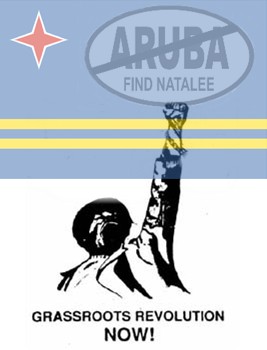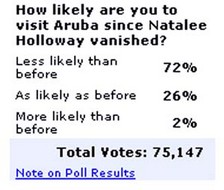BOYCOTT WORKING...GRASSROOTS SPREADS ACROSS COUNTRY
The downward trend of tourism continues in Aruba. The decrease of passengers at Beatrix Airport is now at 12.8%. It should come as no surprise to anyone, although it would appear that Aruban officials kept their heads in the sand far to long, trying to spin the tourism situation and wishing that the Natalee Holloway case would just disappear.
The 3rd quarter from 2005 showed a -3.5% decrease of airline passengers. While other Caribbean islands like Jamaica had record growth in 2005, that was not the case for Aruba. It was also reported that less air-passengers in the second half of 2005. The airline passenger numbers for the 4th quarter in Aruba were down 7.4% as compared to the previous year.
Let us also go back to another prediction. This one comes from the very first post we did regarding the disappearance of Natalee Holloway, (6/2/05) “This Can’t Be Good For Tourism, Where’s Natalee Holloway“.
The disappearance, botched investigation, and boycott coupled with the continual unbelievable events and treatment of the victim, Natalee Holloway and her family have fueled the downward trend of Americans to Aruba. One would think at some point that Aruba officials would have stopped the bleeding and got their act together. Instead we find out late in the game that previously another woman may have been assaulted and nothing was ever done to investigate. We also continue to see an investigation focused on three suspects and no action taken. What does all this lead to?
The 3rd quarter from 2005 showed a -3.5% decrease of airline passengers. While other Caribbean islands like Jamaica had record growth in 2005, that was not the case for Aruba. It was also reported that less air-passengers in the second half of 2005. The airline passenger numbers for the 4th quarter in Aruba were down 7.4% as compared to the previous year.
Remember that famous prediction by the AP, that “the boycott will have no impact on Aruba“?
Let us also go back to another prediction. This one comes from the very first post we did regarding the disappearance of Natalee Holloway, (6/2/05) “This Can’t Be Good For Tourism, Where’s Natalee Holloway“.
The disappearance, botched investigation, and boycott coupled with the continual unbelievable events and treatment of the victim, Natalee Holloway and her family have fueled the downward trend of Americans to Aruba. One would think at some point that Aruba officials would have stopped the bleeding and got their act together. Instead we find out late in the game that previously another woman may have been assaulted and nothing was ever done to investigate. We also continue to see an investigation focused on three suspects and no action taken. What does all this lead to?
The airport of Aruba saw a drop of 12.8 percent passengers.
Maybe the AOL survey had some validity to it when it showed that 72% of Americans were less likely to visit Aruba since Natalee Holloway vanished.
Number of passengers Aruba dropped vigorously
Amigoe; May 2, 2006:
ARUBA – The airport of Aruba saw a drop of 12.8 percent in the number of handled passengers in the first quarter of this year. The number of flight movements dropped with 2.8 percent, announced the Aruba Airport Authority. With 250.585 American passengers, the percentage is lower than last year in the first quarter, namely 15 percent. The number of passengers to and from Venezuela was 34.856, and Europe 26.636. The number of Colombian passengers went up with 9 percent to 13.424.


Experts: Little Impact Expected After Boycott Call
The Clarion Ledger
November 12, 2005
Gov. Bob Riley’s call for a tourist boycott of Aruba, where a Mississippi native has been missing since May 30, had little or no immediate impact and is unlikely to deter trips to the Caribbean island, travel experts said.
“We really have not seen a significant change in interest in travel to Aruba,” said Justin McNaull, AAA Travel spokesman. He said that in the weeks following Natalee Holloway’s disappearance on the final night of a class trip, amid fears she had been murdered and intense media coverage, a few travelers decided to seek other destinations. But that’s not likely now, even with a boycott call.
Holloway lives with her mother in Mountain Brook, Ala. Her father, Dave, and stepmother, Robin, live in Meridian, Miss. Holloway also had attended Clinton Junior High School in Clinton, Miss. “From a longer-term standpoint, as travelers we have a relatively short-term memory, whether it’s terrorism or hurricanes or other events that cast a negative light on a destination,” he said. While the Holloway case is tragic, he said, “it’s seen as an isolated incident.”
Riley called for the boycott of Aruba on Tuesday on behalf of Holloway’s family, who have been critical of the island government’s investigation into her disappearance. Three young men were held for a while in an investigation into Holloway’s possible rape and murder, but a court ruled there was not enough evidence to continue to hold them.
Riley’s call was reported by national news organizations, but he hasn’t yet sent letters to his fellow governors asking for their support, Riley spokesman Jeff Emerson said Friday. Emerson said those letters will go out next week. “It’s not going to be a short-term effort,” Emerson said. “He doesn’t just plan on making an announcement and that’s it.”
Dutch tourism officials say if the travel boycott affects anyone, it will be the island people who have worked hard to assist the family and whose livelihood depends on tourism. “Who it really hurts is the right people who have fought — the hotel owners, the waiters, the people who have helped this family providing rooms and boats,” said Robert DiLella, a consultant to the Aruban Tourism Authority who launched www.arubatruth.com shortly after the investigation began. “Now they’re being told ‘That wasn’t good enough, you didn’t help and now you’ll suffer for this.’ ”
Travel groups, while reporting little to no change in bookings to Aruba, expect any cancellations or loss of interest in trips to the island to be confined to Alabama. “We have not booked very many trip to Aruba since all this started,” said Clay Ingram, spokesman for AAA Alabama. “I’m sure to people living in Alabama, this is a lot closer to home. How it affects people in other states, I couldn’t say.”
But Steve Cape, a spokesman for Springdale Travel in Mobile, said his agency hasn’t had any Aruba trip cancellations because of Riley’s call for a boycott.

“We really have not seen a significant change in interest in travel to Aruba,” said Justin McNaull, AAA Travel spokesman. He said that in the weeks following Natalee Holloway’s disappearance on the final night of a class trip, amid fears she had been murdered and intense media coverage, a few travelers decided to seek other destinations. But that’s not likely now, even with a boycott call.
Holloway lives with her mother in Mountain Brook, Ala. Her father, Dave, and stepmother, Robin, live in Meridian, Miss. Holloway also had attended Clinton Junior High School in Clinton, Miss. “From a longer-term standpoint, as travelers we have a relatively short-term memory, whether it’s terrorism or hurricanes or other events that cast a negative light on a destination,” he said. While the Holloway case is tragic, he said, “it’s seen as an isolated incident.”
Riley called for the boycott of Aruba on Tuesday on behalf of Holloway’s family, who have been critical of the island government’s investigation into her disappearance. Three young men were held for a while in an investigation into Holloway’s possible rape and murder, but a court ruled there was not enough evidence to continue to hold them.
Riley’s call was reported by national news organizations, but he hasn’t yet sent letters to his fellow governors asking for their support, Riley spokesman Jeff Emerson said Friday. Emerson said those letters will go out next week. “It’s not going to be a short-term effort,” Emerson said. “He doesn’t just plan on making an announcement and that’s it.”
But those who research boycotts say this one may be a futile effort
- “No, it won’t work. It’s pretty much like a warning,” said Usha Haley, professor of international business and director of the Global Business Center at the University of New Haven.
- “Generally speaking, I doubt a boycott called for by the governor of one state would have significant impact on Aruba’s tourism,” said John Frendreis, a political science professor at Loyola University in Chicago. Frendreis, who called Riley’s announcement “a symbolic gesture,” said it’s unlikely that one family’s tragedy would prompt political moves in other states.
Dutch tourism officials say if the travel boycott affects anyone, it will be the island people who have worked hard to assist the family and whose livelihood depends on tourism. “Who it really hurts is the right people who have fought — the hotel owners, the waiters, the people who have helped this family providing rooms and boats,” said Robert DiLella, a consultant to the Aruban Tourism Authority who launched www.arubatruth.com shortly after the investigation began. “Now they’re being told ‘That wasn’t good enough, you didn’t help and now you’ll suffer for this.’ ”
Travel groups, while reporting little to no change in bookings to Aruba, expect any cancellations or loss of interest in trips to the island to be confined to Alabama. “We have not booked very many trip to Aruba since all this started,” said Clay Ingram, spokesman for AAA Alabama. “I’m sure to people living in Alabama, this is a lot closer to home. How it affects people in other states, I couldn’t say.”
But Steve Cape, a spokesman for Springdale Travel in Mobile, said his agency hasn’t had any Aruba trip cancellations because of Riley’s call for a boycott.













No comments:
Post a Comment